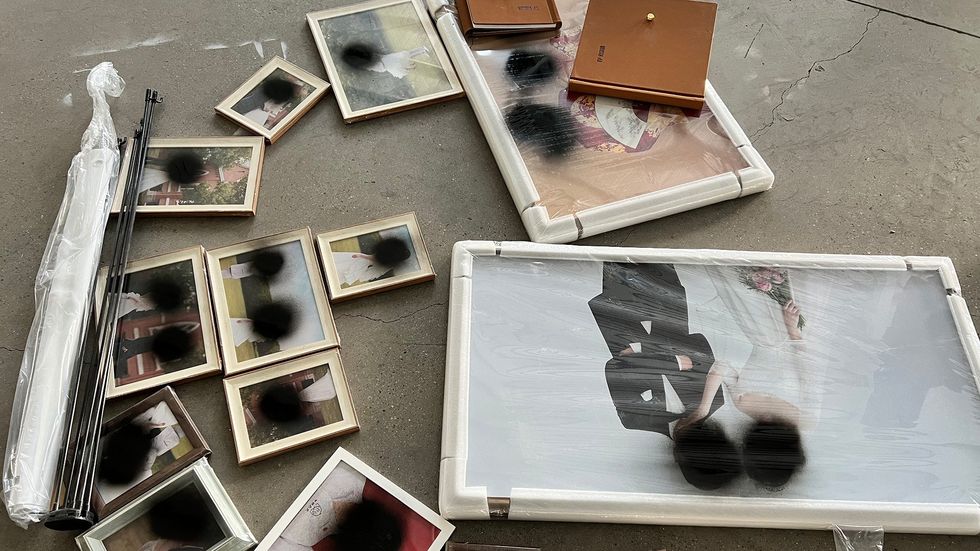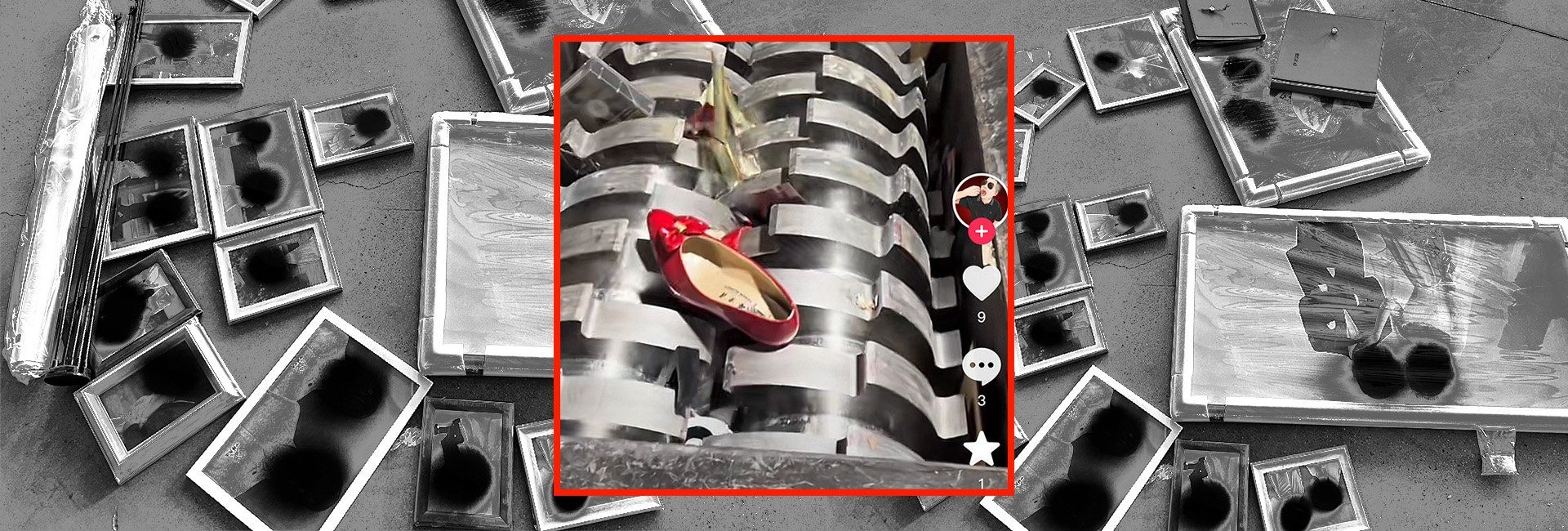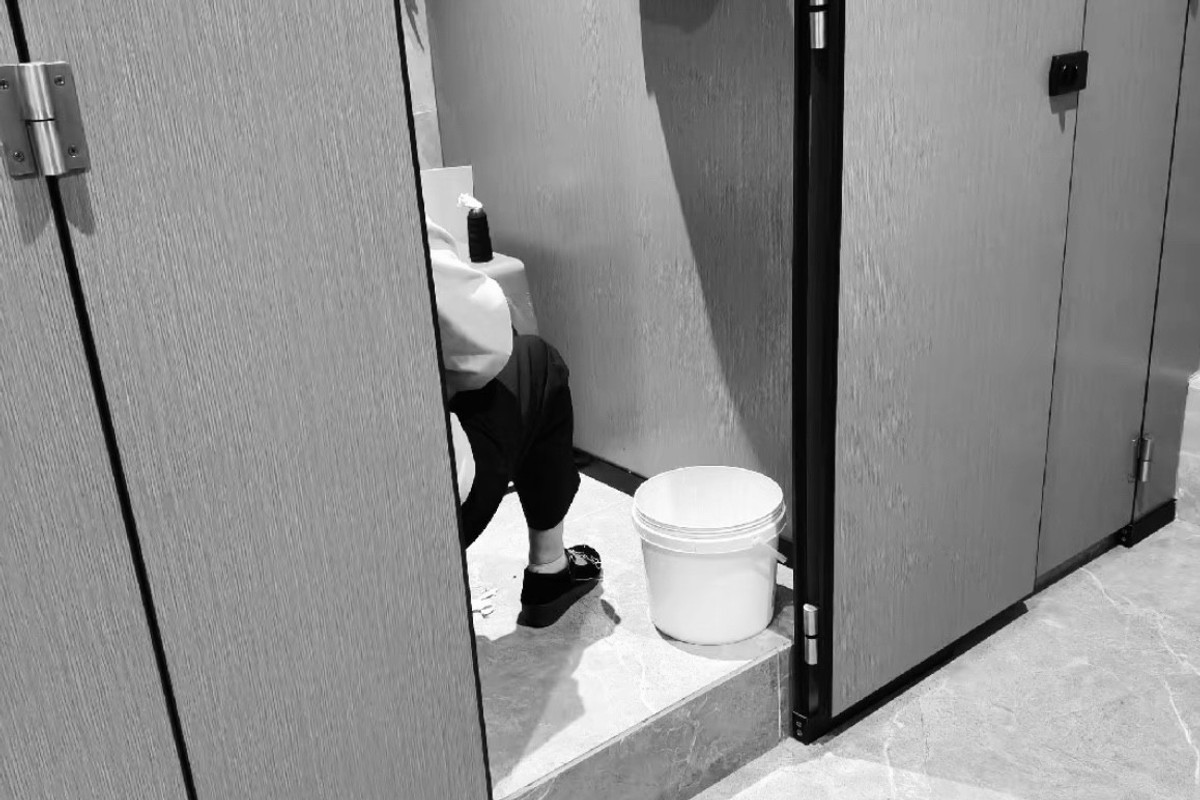Wei Liu hopes one day his clients will no longer be ashamed to face the failure of their marriage.
Wedding dresses, wedding photos and wedding shoes make up the bulk of orders for Wei Liu’s thriving business that has caught the attention of the world’s media. In the past six months, he has received more than 60 requests for media interviews about his business in Hebei province, China. “The German media will come for an interview next week.” he said, a hint of tiredness in his tone.
Liu, 41, is in the wedding business, but not in the usual way. He is based at a waste disposal centre in the town of Langfang, Hebei province, and his job is to properly destroy the “love rubbish” for his customers when relationships go bad.
The former employee of a state-owned enterprise recalls the idea for a wedding photo destruction business began as a much broader concept of destroying personal electronic items for privacy reasons, such as cameras, computer mainframes, mobile phones and hard drives.
In spring 2023, Liu and his business partner, Weiguang Yang, were anxious about drop off in demand for their business of destroying personal electronic items. “There seemed not too many people who required this.” The turning point came with an order for destruction of electronic rings.
Liu knew the contents of hard drives they received for erasure were largely photos. So, Liu and his partners discussed a new niche direction for the venture, to focus on the destruction of wedding photos.
'One young man asked to destroy the photos immediately upon arrival ... the next day, before I signed for the package, he sent me a message that his wife came back.'
Liu understood the power of publicity, having had previous experience with the Internet and media. He created a Douyin social media account to record the process of shredding wedding photos. These short videos not only attracted Chinese news media attention but also many views and comments from Douyin users.
The response has been mixed. The short videos received many negative comments with some netizens arguing it was a waste of money or unethical. “Why not destroy them by themselves?” Some jokingly called it “a mass grave of love”.
Liu did not care. “I believe I have very sound judgment and values, so I think some of them are just nonsense,” he said. These days, he still posts his videos to Douyin but does not check the comments section.

In traditional Chinese thinking, it is an unlucky thing to burn or tear photos of people who are still alive. It can bring a curse or bad luck. Because of this, many divorced people feel compelled to keep their old wedding photos and put them out of their sight. There are also government regulations around burning. “To prevent the haze, it is not allowed to burn things indiscriminately in the north,” Liu said, “so the wedding photos can’t be burned either.”
In rural areas, people are worried about other people in the village finding their discarded wedding photos. “At first we thought there might be less need for this service in the countryside,” said Liu. However, a colleague of Liu from the countryside explained once villagers see the photos in the rubbish, the people in the wedding photos are likely to become the center of a rumor mill, so they too would be potential clients of the service.
Liu believes the market for his business is promising, saying in the domestic market there are "very few people, basically a blank [in terms of competition].” Their target consumers are first and second-tier urban women.
The cost of Liu’s service will depend on the weight of the wedding photos with prices ranging from 59 yuan to 159 yuan (about AU$13 to AU$35). In the year to April 2024, the business received around 1,300 orders for wedding photo destruction. Of those making inquiries, 63 per cent were women, and of those who followed through to purchase the service, more than 70 per cent were women. The customers are usually aged between 24 and 40.
In 2023, China’s Ministry of Civil Affairs reported 2,593,000 divorces were registered in China, according to The Beijing Daily. Comparing his 1,300-plus sales to the number of divorces nationwide, for Liu, “this is a poor score”. He hesitated for a moment, and then explained: “I can’t say it’s bad, it’s a passing grade maybe.”
Protecting clients’ privacy is a core principle of this new service. When talking to clients, Liu repeatedly reminds himself that “we can’t persuade, nor can we advise”. This is the rule he has set for himself and his team. This doesn’t mean that as a businessman, Liu is not willing to make a deal and make money. “I don’t want to cause my customers to make regrettable decisions. This is not the same as buying goods, which are returnable. Burning can’t be returned. Right?"
"The only thing I can do is listen,” he said.
As word of his business has spread, Liu’s factory in Langfang receives packages from many parts of eastern China each month now, as well as from further afield in Xinjiang and Taiwan. The first thing Liu does when he receives a package is to reconfirm with the customer, “whether to destroy or not”. Then he spray paints it according to the customer’s requirements. The destruction requirements can be diverse. One customer asked to spray only the “bride” with black paint and retain the “groom” part of the image. Another female client wanted green paint because it was feng shui-related.
After this step, the wedding photos are put into the shredder. In a special case, one client asked for a soundtrack to be played during the shredding. Naturally, clients who are not at the destruction site can receive video footage of the entire process, which reassures them the items were indeed incinerated.
The silver-grey steel gears of the shredder tear photographs and the frames they rest in to shreds. The paper scraps and smashed frames will be thrown into the incinerator with the rest of the household waste to be burnt at high temperatures.
In doing this, the bad energy of the now broken marital relationship is reduced to a plume of smoke billowing from the chimney. Those symbols of broken love disappear into the air.
“There are instances of infidelity. There are the anti-gay reasons. As well as the death of a loved one or pet. In short any type,” Liu said of the reasons people contact them.
However, given their client privacy principle, Liu and Weiguang offer very little detailed information about the hidden stories behind these “dead loves”. One experience Liu does share made a big impression on him. One young man asked Liu to destroy the photos he had sent immediately upon arrival of his package. “But the next day, before I signed for the package,” Liu recalled, “he sent me a message that his wife came back.” As a result of this incident, Liu decided to set a “storage cooling-off period” before he would destroy any wedding material he was sent.
In the wake of recent media exposure, Liu has received more orders but less communication with customers “because the media will say some of the customer’s story. Many people see the news, conversely, they are not willing to talk to me. Now it’s hard for me to get a little bit of customer stories. They must be worried about the risk of exposure of their affairs.”
“In the beginning, I just treated it as a side job, but now it’s become my main job.”
Wedding photo destruction now occupies most of Liu’s time. He devotes himself to it wholeheartedly. He confessed that he had wanted to give up the business “before becoming a media focus, I have thought about not doing it, because of the meagre profits. But now it is unlikely.”
Liu believes that the service of wedding photo destruction provides customers with the physical value of destruction, while more importantly, the emotional value. Liu’s team is delighted to provide clients with a sense of ceremony, whether it’s a musical send-off or taking a photo for the destruction.
Liu laughingly describes himself as an idealistic person. He loves the nickname given to his crushing machine by Douyin users - “Love Sea Donor Guest”. It means destroying the world’s love which is like the flowing water. The “death love” will eventually turn into dust and fall to the bottom of the sea. And the cold, hard machine is the vehicle that helps “love” to die. The objects are struggling in the shredder, as if trying to survive.
Liu feels the significance of his work is not only to make a difference in his own life but the greater significance is to change the perceptions of people whose marriages have failed.
“Uncovering the scars again can cause people to feel pain or feel ashamed and disgraced ... They are ashamed to talk about their failed marriage. It’s very normal human thinking. I want to make it popular so that people dare to face the pain, whether the failed marriage or hateful emotions.”






